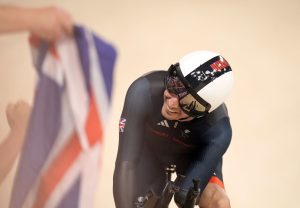Jaco van Gass Claims Paralympic Gold Just a Week After Car Accident
3 min read
Jaco van Gass wins Paralympic gold medal a week after being hit by a car

Jaco van Gass wins Paralympic gold medal a week after being hit by a car
A week ago, Jaco van Gass found himself in a French hospital, his dreams of Paralympic glory seemingly shattered. The 38-year-old British cyclist had been struck by a car while training, leaving him battered and bruised, and casting doubt on his ability to defend his Paralympic title.
Reflecting on the incident, van Gass described the emotional turmoil he felt. “I was heartbroken, thinking this could be the end of my Paralympics before it even started,” he shared with Paralympics GB. The accident left him deeply concerned about his future in the competition.
Van Gass’s swift transfer to the hospital and the exceptional care he received were crucial. Despite the severe bruising and stiffness, he was determined to get back on his bike. “The next day was tough, with intense soreness, but I pushed through,” he recounted. “Within two days, I was back on the bike. The injury wasn’t as severe as it seemed—after all, it was only a Renault!”
His resilience paid off dramatically on Friday when he made a stunning return to the velodrome. Van Gass powered through the men’s 3000-meter individual pursuit, not only securing the gold medal but also setting a new world record. His impressive performance saw him narrowly defeat teammate Fin Graham in the final.
This victory marked van Gass’s third Paralympic gold medal and fourth overall, following his two golds and a bronze from the Tokyo Games. With four more events still to come in Paris, he remains in contention for additional medals, having already set a second world record during the qualifying rounds of the men’s C1-3 1000m time trial.
Van Gass reflected on his journey, noting, “I went to Tokyo as an underdog, won two golds, and broke three world records. Now, there’s immense pressure to retain my titles, but this win is a significant milestone.”
Before his cycling career, van Gass was a British Army paratrooper. His life took a dramatic turn in 2009 when he sustained severe injuries, including the loss of his left arm, from a rocket-propelled grenade in Afghanistan. He underwent 11 operations and faced a long recovery process.

Despite these challenges, van Gass embraced new adventures. He became a multiple marathon runner, downhill skier, and embarked on daring expeditions, including an unsupported trek to the North Pole with fellow wounded soldiers. He even attempted to summit Mount Everest, narrowly missing the peak due to weather conditions.
Eventually, van Gass channeled his energy into cycling, achieving remarkable success at the Tokyo Paralympics, which were affected by the COVID-19 pandemic. “Standing on that podium in Tokyo with empty stands was a poignant moment,” he recalled. “I made a conscious decision to focus solely on training and forgo other adventures to achieve this level of success.”
Van Gass’s journey from the brink of giving up to achieving gold is a testament to his extraordinary determination and resilience. His remarkable comeback and continued success on the international stage highlight not only his athletic prowess but also his unwavering spirit in the face of adversity.